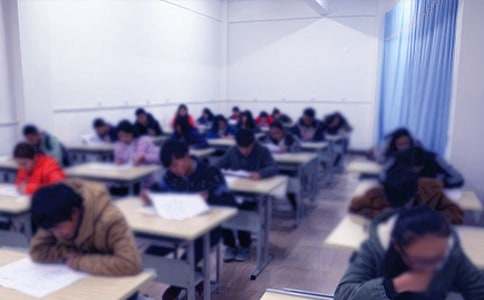- 相關(guān)推薦
關(guān)于考研英語模擬考試題
SectionⅠ Use of English

Directions: Read the following text. Choose the best word(s) for each numbered blank and mark A, B, C or D on ANSWER SHEET 1.( 10 points )
Health implies more than physical fitness. It also implies mental and emotional well-being. An angry, frustrated, emotionally 1 person in good physical condition is not 2 healthy. Mental health, therefore, has much to do 3 how a person copes with the world as she/he exists. Many of the factors that 4 physical health also affect mental and emotional well-being.
Having a good self-image means that people have positive 5 pictures and good, positive feelings about themselves, about what they are capable 6 , and about the roles they play. People with good self-images like themselves, and they are 7 like others. Having a good self-image is based 8 a realistic 9 of one's own worth and value and capabilities.
Stress is an unavoidable, necessary, and potentially healthful 10 of our society. People of all ages 11 stress. Children begin to 12 stress during prenatal development and during childbirth. Examples of stress inducing 13 in the life of a young person are death of a pet, pressure to 14 academically, the divorce of parents, or joining a new youth group. The different ways in which individuals 15 to stress may bring healthful or unhealthy results. One person experiencing a great deal of stress may function exceptionally well 16 another may be unable to function at all. If stressful situations are continually encountered, the individual's physical, social, and mental health are eventually affected.
Satisfying social relations are vital to 17 mental and emotional health. It is believed that in order to 18 , develop, and maintain effective and fulfilling social relationships people must 19 the ability to know and trust each other, understand each other, influence, and help each other. They must also be capable of 20 conflicts in a constructive way.
1. A. unstable B. unsure C. imprecise D. impractical
2. A. normally B. generally C. virtually D. necessarily
3. A. on B. at C. to D. with
4. A. signify B. influence C. predict D. mark
5. A. intellectual B. sensual C. spiritual D. mental
6. A. to be doing B. with doing C. to do D. of doing
7. A. able better to B. able to better C. better to able D. better able to
8. A. on B. from C. at D. about
9. A. assessment B. decision C. determination D. assistance
10. A. ideality B. realization C. realism D. reality
11. A. occur B. engage C. confront D. encounter
12. A. tolerate B. sustain C. experience D. undertake
13. A. evidence B. accidents C. adventures D. events
14. A. acquire B. achieve C. obtain D. fulfill
15. A. respond B. return C. retort D. reply
16. A. why B. when C. while D. where
17. A. sound B. all瞨ound C. entire D. whole
18. A. illuminate B. enunciate C. enumerate D. initiate
19. A. access B. assess C. process D. possess
20. A. resolving B. saluting C. resolving D. solving
SectionⅡ Reading Comprehension
Part A
Directions: Read the following four texts. Answer the questions below each text by choosing A, B, C or D盡ark your answers on ANSWER SHEET 1保40 points)
Text 1
As we have seen in earlier chapters, the American definition of success is largely one of acquiring wealth and a higher material standard of living. It is not surprising, therefore, that Americans have valued education for its monetary value. The belief is wide spread in the United Statesthat the more schooling people have, the more money they will earn when they leave school. The belief is strongest regarding the desirability of an undergraduate university degree, or a professional degree such as medicine or law following the undergraduate degree. The money value of graduate degrees in “nonprofessional” fields such as art, history, or philosophy is not as great.
This belief in the monetary value of education is supported by statistics on income. Ben Wattenberg, a social scientist, estimated that in the course of a lifetime a man with a college degree in 1972 would earn about¥380 000 more than a man with just a high school diploma. Perhaps this helps to explain survey findings which showed that Americans who wished they had led their lives differently in some way regretted most of all that they did not get more education.
The regret is shared by those who have made it to the top and by those who have not. Journalist Richard Reeves quotes a black worker in a Ford automobile factory.
When I was in the ninth grade, I was getting bad grades and messing around. My father came home in the kitchen one night with a pair of Ford work pants and he threw them in my fac” “Put these on,” he said, “because you're going to be wearing them the rest of your life if you don't get an education.”
Douglas Fraser, the president of the United Auto Workers Union, regretted not finishing high school so much that he occasionally lied about it. He told Richard Reeves about his pride in graduating from high school, but then a few minutes later he said:
I wasn't telling the truth about high school. I never finished. I quit in the twelfth grade to take a job…It's funny after all these years, I still lie about it. Because the fact is, I still think it was a stupid thing to do. I should have finished my education.
Even a man like Fr
【考研英語模擬考試題】相關(guān)文章:
英語寫作基礎(chǔ)自考試題01-29
考研英語作文06-15
考研英語作文06-16
英語考研作文04-07
考研英語作文06-15
英語考研作文02-15
考研英語作文01-28
一年級語文模擬考試題11-02
考研英語作文模板07-20
考研英語作文:Botany08-08